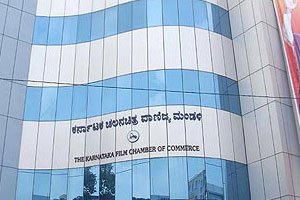
With a low budget, we can not copy a Hindi film ... If we try, it becomes a cheap imitation, says Bhaktavatsala.
He is not particularly fond of delving into the past. But he is a person with down to earth that turns one's spirit with witty humor and anecdotes.
Dr. Rajkumar Award Recipient 2012, for Lifetime announced by the state government last month, M Bhaktavatsala is man searching for an authoritative account of the film industry over the past five decades.
Film critic, producer, distributor and actor, who was instrumental in developing guidelines revoke imperial censorship regulations.
As president of the Chamber of Commerce Karnataka Film (KFCC), the youngest president of the Federation of Indian Cinema (the only one of Karnataka, in the last 40 years) and twice president of the House of Cinema South India Trade, having held various positions in the industry. He has dabbled in acting, too, in films like 'Chandamarutha' and 'Avasthe'. From mountaineering to business management, her life story is impressive.
In an interview with Deccan Herald, which gives an idea of his enthusiasm for the film industry management and the search for "something of lasting value."
The race started at HMT. He completed MBA in the UK (in 1958) and, on his return, he was appointed Director of Industrial Relations HMT. During his stay there, the company opened the watch factory in collaboration with the Citizen Watch Company, Japan. While the Japanese were confident that Indian girls could not match the craftsmanship of Japanese women, he took it as a challenge. "I told the watch 'Kasoothi.' Girls selected for the job. After three months, the Japanese shot down by the abilities of girls."
Five years later, Bhaktavatsala was just one step from being the general manager when he left HMT. "I wanted to do something of lasting value. Films were not new to me. Though my family was mostly in the liquor business, my uncle Narayana Swamy Moola Lakshmi had established Vahini Studios. I was interested in the organizational aspects of the industry cinema. "
He started to put things in order. For the first time, has created a segregation of producers, distributors and exhibitors. Although association with KFCC began in 1965, he did not assume the position until 1971.
The turning point was the Conference of All India Film Industry. "People across the country participated and realized industry Kannada. After my presentation on self-regulation and sectoral management of the movie industry, which was copied instantly throughout the country."
Then came the stage with the Censor Board. . "When I went to the Censor Board, there were 107 guidelines, all made at the beginning of the century A rule says:" The natives should not be shown dancing with a white woman. 'I wrote five guidelines instead of the 107 I wrote that censorship should be sensitive to social changes. And that, nothing offensive to human sensibilities should be portrayed in the movies. "
Again, it was a five-year term followed by five years at the National Film Corporation (NFDC). "I was part of the commission was nominated to study the film industry in the country. Shivaram Karanth Led by the team traveled 24 cities in two years. The result of this report was the NFDC."
But movies are not all. He reads a lot and likes mountaineering. He has climbed almost all the peaks in the Himalayas. In 2002, the knees betrayed and had to take a break.
As for the film industry in Karnataka, Bhaktavatsala now refers to it with some dismay. "Today it has become an industry of copy. With a low budget, if we try to mimic the richness of a Hindi film (which sees investment crore), it becomes a cheap imitation."
He sees the adaptation of the rich literature in Kannada films as one of the ways to revive the industry. He goes by the simple logic: "If you have no audience, you do not exist."






















